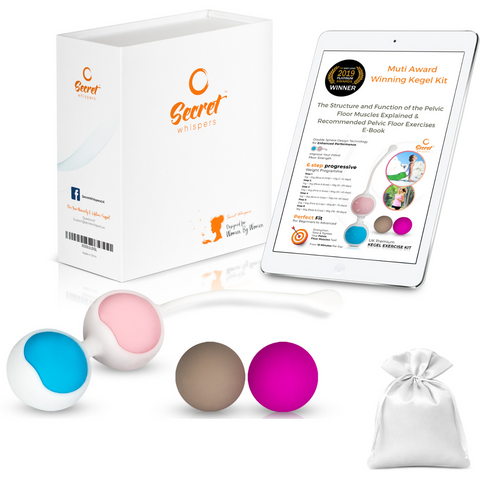Can Hay Fever Cause Bladder Problems?
Hayfever, also known as allergic rhinitis, affects millions of people worldwide with symptoms like sneezing, itchy eyes, and a runny nose. While these symptoms are well-known, many are unaware that hayfever can also impact the bladder, causing a range of urinary issues.
In this blog, we'll explore how hayfever and its treatments might be linked to bladder problems and provide practical tips for managing these symptoms.

Can Antihistamines Affect Your Bladder?
Antihistamines are commonly used to manage hayfever symptoms. However, these medications can have side effects that impact the bladder. Antihistamines work by blocking histamine receptors, reducing allergic reactions, but they also have anticholinergic effects, which can decrease bladder muscle contractions. This can lead to urinary retention, where the bladder doesn't empty completely, causing discomfort and increasing the risk of urinary tract infections (UTIs).
Overflow incontinence is when your bladder isn’t emptying properly and leaking urine consistently even after emptying your bladder. This consistent dribble is referred to as overflow. The urine being left in the bladder increases the chances of bacteria breeding leading to urinary tract infections (UTI’S)

Can Allergies Cause Bladder Control Problems?
Allergic reactions can exacerbate bladder control problems in several ways. For instance, inflammation from allergic reactions can affect the nerves that control the bladder, leading to overactive bladder symptoms such as urgency and frequency. Moreover, the general stress and physical strain caused by allergy symptoms can indirectly contribute to bladder control issues.
How Sneezing Can Cause Incontinence
Sneezing is a common symptom of hayfever, but did you know it can also cause incontinence? Sneezing increases intra-abdominal pressure, which can overwhelm the pelvic floor muscles. This sudden pressure can lead to stress incontinence, especially in individuals with already weakened pelvic floor muscles.
For those who already experience bladder control issues, frequent sneezing can significantly exacerbate the problem.
Did You Know That Constipation Is a Side Effect of Some Allergy Medications?
Many allergy medications, particularly antihistamines, can cause constipation as a side effect. Constipation can indirectly affect bladder function by putting additional pressure on the bladder, making it harder to control urination.
The close anatomical relationship between the bowels and the bladder means that issues in one system can easily influence the other.
Clinical Correlation Between Overactive Bladder and Allergy in Children
Emerging research suggests a clinical correlation between overactive bladder (OAB) and allergies in children. Studies have shown that children with allergic conditions, such as hayfever, asthma, and eczema, are more likely to experience OAB symptoms.
This connection is thought to be due to the systemic inflammatory response associated with allergies, which can affect bladder function. Additionally, the stress and discomfort from allergic symptoms can contribute to the frequency and urgency of urination in children.
Understanding this link is crucial for parents and healthcare providers to address both allergies and bladder issues effectively.
5 Tips to Avoid Allergies Affecting Your Pelvic Floor
-
Stay Hydrated: Drinking plenty of water can help keep your bladder healthy and reduce the risk of UTIs, which can be more common when dealing with urinary retention caused by antihistamines.
-
Pelvic Floor Exercises: Strengthening your pelvic floor muscles through exercises like Kegels can help improve bladder control and reduce the risk of incontinence caused by sneezing or other allergy symptoms.
-
Manage Your Allergies: Work with your healthcare provider to find the most effective allergy treatment with the least side effects. Non-sedating antihistamines may be a better option for some people as they tend to have fewer urinary side effects.
-
Monitor Medication Side Effects: Be aware of the side effects of your allergy medications. If you experience urinary retention or other bladder issues, discuss these with your doctor, who may adjust your treatment plan.
-
Maintain Regular Bowel Movements: Prevent constipation by eating a high-fiber diet, staying hydrated, and exercising regularly. This can reduce additional pressure on your bladder, helping to maintain better bladder control. AND, don't forget to use a footstool when you go for a poo!
In conclusion, while hayfever is primarily associated with respiratory symptoms, it can also impact bladder function. By understanding the connections between allergies, medications, and bladder issues, and by following practical tips to manage these effects, you can reduce the impact of hayfever on your overall well-being. Always consult your healthcare provider for personalized advice and treatment options.
IF YOU FOUND THIS BLOG USEFUL YOU MAY LIKE:
Our Next 30 Day Pelvic Floor Challenge - Starts on Monday 5th August.
Learn how to correctly exercise your pelvic floor, learn our successful bladder distraction techniques and get a STRONGER Pelvic Floor!
Click the image below to read ALL The 5 STAR Reviews 🌟🌟🌟🌟🌟
⬇️⬇️⬇️
You can also join our fabulous womens only private Facebook Group
Never miss another blog again. Sign up now to our weekly Newsletter. You will get a 10% discount code to use too. Just click below ⬇️⬇️⬇️
Learn How Secret Whispers Pelvic Floor Strengthener Helped Astrid below...
Buy Now - Just £47.97 and they last for LIFE.....














